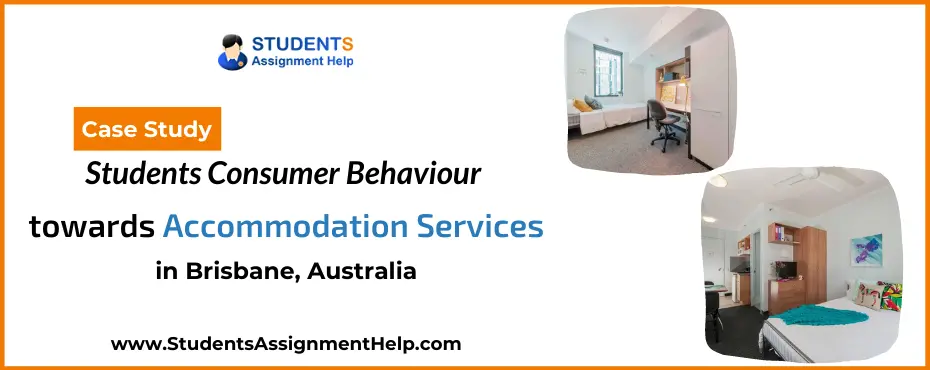Case Study: Analysis of Consumer Behaviour of Students towards Accommodation Services in Brisbane, Australia

Executive Summary
Consumer behaviour is a dynamic concept and changes rapidly in accordance with the change in the environmental conditions. Proper and careful study of consumer behaviour is extremely significant in order to gain foothold in the market place. The careful study of consumer behaviour enable the marketers in analysing and ascertaining consumers decision making process and offering products and services accordingly.
It is a well known fact that products and services offered to the consumers in accordance with their needs and desires holds higher probability of being purchased by them. Likewise, student accommodation has been emerged as one of the growing and demanding service field in the educational settings. The national and international universities have identified student accommodation as one of the most vital component of their overall education packages.
In this regard, the underlying report aims at analyzing behaviour of students coming to Brisbane, Australia for study purpose. The situational analysis will also be performed in order to gain background information about the student accommodation service. Primary and secondary research will also be conducted to collect original information about the students (consumers) behavior. The above stated analysis will also throw light on various gaps existing in the student accommodation service and recommendations are fostered accordingly.
Buy high-quality essays & assignment writing as per particular university, high school or college by UK, USA & Australian Writers
Introduction
Securing a convenient, affordable, safe and secured accommodation at the right place or location appears to be the most difficult task for students now-a-days. Students confronted through various questions and priorities before selecting and choosing an affordable and convenient accommodation to live and survive. It seems also imperative for the students to analyse various options and priorities before arriving at a decision as it is likely to affect his or her way of living and sustaining.
Student accommodation services exist in various forms or it can be availed in different forms like rentals, full board, and home stay, shared and so on (Living In Australia, 2012). In this regard, international universities of Brisbane, Australia give due recognition and importance to the accommodation services for different campus. It is due to reason that accommodation service also act as a first point of contact with the existing and prospective students whereby university can advice and provide them with the necessary resources.
Situational analysis and background
The situation analysis has been conducted in order to collect detailed information about the product or service offered to the consumers, name of the parent company, benefits offered to the consumers, stages of product or service, competitive position, and many more. The name of the service is student accommodation in Brisbane, Australia. The national and international students coming to such universities assumed to be the main customer group of the service (Cressey, 2004).
The benefit offered to the students under the provision of accommodation service can be classified into-core, expected and augmented benefits. The core benefit is the main fundamental or basic need of the customers served by the products and services. The accommodation is the main fundamental or basic need appears to be served by the student accommodation service.
Stuck with a lot of homework assignments and feeling stressed ?
Take professional academic assistance & Get 100% Plagiarism free papers
The expected benefit represents the total set of features and characteristics that the students expect to receive at the time of purchasing service. Such benefits comprise of comfort, convenience, superior food quality, hygiene environmental conditions, etc. The third set i.e., augmented benefits include additional features or attributes provided in order to differentiate product and service from those of competitors.
The additional features in student accommodation service at the concerned universities are pleasant ambience of hostels and food courts, regular conduction of get-together programs, sporting or extra-curricular activities for students residing in hostels, internet facility, currency exchange facility, prepaid mobile sim cards, etc. All these benefits and services differentiate student accommodation services of international universities of Brisbane, Australia from other universities (McNeil, 2002).
The average cost of student accommodation in Brisbane, Australia is about $ 18000-$ 25000. The international universities of Brisbane, Australia adopt competitive pricing strategies with its competitors. The average cost keeps on fluctuating and also ranges from A$ 19000-$24000 at some instances. In the past few years, total cost of student accommodation in Brisbane universities ranged from A$ 22000-$ 27000 per year (Cost of living for students. The University of Western Australia, 2012).
The student accommodation service of the international universities of Brisbane, Australia falls in between introduction to growth stage of the product life cycle. It is due to the reason that number of international students coming to the Australia for study purpose is increasing continuously (Monash University 2012). The continuously increasing proportion of the international students in Australia for study purpose witnessed conducive study environment and goal oriented services of prevailing universities.
The increasing proportion of international students also act as motivating factor and led to the emergence of various national and international universities in Brisbane, Australia. The emergence of wide number of national and international universities pose a threat on the competitive position of existing universities and led such universities to strive towards offering quality accommodation service to the students across the world.
Market segments and specific target market segment profile
It seems desirable to divide the target market among different homogenous segments to serve the needs of target market more effectively. There are various bases of segmenting the market into sub-divisions. The four common bases are geographic, demographic, psychographic and behavioral. The target markets for the present report has been identified and segmented on the basis of behavioral bases.
The behavioral bases divide the market on the basis of benefits, interest, and activities of consumers. The behavioral base has enabled to divide the market on basis of activities, interest, and behavior prevailing for the international students coming to Brisbane, Australia for study purpose (What Can I Study? Courses and Fees, 2012).
On the grounds of the behavioural base, the two identified target markets are- students coming to universities for full-time study purpose and part-time students approaching universities for pursing vocational courses. The underlying report focuses specifically on students coming to the universities from worldwide in order to pursue full time or regular study courses.
The main reason behind selecting regular or full-time students is the attractiveness and large size of this target market. It has been identified that proportion of full time or regular students is quite wide and large as compared to part time students (Accommodation options and costs, 2012).
Moreover, full time students also bring wider opportunities to the university in terms of high revenues, building credibility, expansion into other countries, etc. Preparing and designing integrated accommodation services for the full time students paves the path of earning positive image and goodwill in the education field across the globe. All these factors and opportunities have made the target market segment of full time or regular students more lucrative and attractive and facilitate its selection in the report.
Primary research
Primary research has been conducted with the purpose of collecting original and first hand information about the accommodation services prevailing in the Brisbane, Australia. The tool named interview has been employed for primary research purpose. Interview method provides the qualitative information related to the subject areas. The nature of the study appears qualitative in nature and therefore qualitative information can prove helpful in gaining information about various minute aspects. Five students are selected from the identified or selected target market. The respondents are selected randomly in order to avoid any kind of biasness from affecting the research process.
The respondents are confronted with five questions related to the various aspects of accommodation services. Information gathered through such questions proves helpful in interpreting and understanding customer behaviour and its implications on the entire accommodation packages. The brief analysis of the findings gathered through questions posed to the respondents revealed that students believed that accommodation cost is somewhat high of Brisbane, Australia universities and thus restricts or limits the scope of entry of middle and lower income group customers. In addition, majority of respondents also hold the perception that there are various situational and environmental factors affect their decision and choice. The detailed analysis of the influencing factors will be discussed in the further section (Visas, Immigration and Refugees, 2012).
Moreover, opinions of the students in drafting and preparing accommodation services plan also hold vital importance according to the responses of the respondents. However, the universities do not entertain the students’ suggestions and modifications at the time of designing accommodation service packages. It has also been analysed that is lack of satisfaction measuring mechanism in post-purchase process in the concerned universities. The absence of satisfaction measurement prevent the universities from designing user friendly or customer oriented accommodation packages in order to gain foothold in the education field.
Consumer Decision Process
Consumer decision process is one of the crucial steps and assumes to play significant role in customer behaviour. The decision making process provides a deliberate idea and knowledge about the steps likely to take place in the consumers mind at the time of making purchase decision. The consumer decision making process for the national and international students seeking accommodation in Brisbane, Australia includes five interrelated steps-problem recognition, information search, evaluation of alternatives, choice and selection of alternatives and post-purchase processes. The detailed explanation of each of these interrelated steps and their implication on the consumer behaviour has been discussed under the following headings:
Problem Recognition
This step deals with the need identification process incurred in the consumers’ minds. Consumers feel the need of purchasing any product or service when he or she perceives significant difference between the actual and ideal state of living. Likewise, national and international students need or problem of accommodation has been researched and investigated by the universities in order to solve or satisfy this need through offering reliable accommodation services.
International students coming to Brisbane, Australia for study purpose visualise accommodation services as one of the major need or problem requires to be addressed adequately. This situation of problem or need led the students to avail accommodation services to solve their accommodation problem. Education universities of Brisbane, Australia identify this difference in the students’ minds as an opportunity and strive towards converting this opportunity into purchase action through offering reliable accommodation services.
Information Search
This step is closely interrelated with the above step of need identification or problem recognition. It seems pertinent that after identifying and recognising that problem or need exists, consumers search for the information that can prove helpful in solving or satisfying the identified problem or need. The information search process also seems relevant for the prospective international students coming to Brisbane, Australia for study purpose.
The prospective students can recall the information related to the accommodation services provided by the universities from their memory or through any advertisement or other promotional tools used by the universities for the Publicity. In this regard, it is considerable necessary for the concerned universities to publicise and display the information related to their curriculum, accommodation, education facilities, and infrastructure at regular intervals in order to enable the students to satisfy their information search process quickly without wasting huge time and effort.
The information search for the prospective international students can be classified into internal and external search. Internal search involves searching and utilising information exists in the students’ minds. In other words, students try to recall information exists in their memory in internal search process. On the other hand, external search involves gathering information from external environment like through advertisement, word of mouth publicity, discussion, etc. (Louvieris, Driver & Powell-Perry, 2002).
Evaluating And Searching Alternatives
The students (consumers) evaluate and test the different purchase alternatives after collecting information about the various universities and accommodation packages offered by them. The evaluation is done on various grounds like price structure, brand name, performance of universities, campus placements, etc. The students perform thorough analysis of the alternative in order to select best possible alternative.
Selection Of Alternatives
This is the implementing step whereby students make a purchase decision and select the most feasible and profitable alternative. The selection of alternative takes place only when all the above steps take place in a positive manner. It is due to reason that proceeding of all the steps in a positive manner facilitates the students to develop favourable behaviour and attitude towards concerned universities.
Post-Purchase Processes
This step hold vital importance in the entire decision making process in the recent years. This is due to reason that this step measures the customer satisfaction level, loyalty, purchase dissonance, etc. The evaluation of all these aspects is necessary to determine and ascertain repeat purchase behaviour of students. In this regard, universities of Brisbane, Australia can conduct survey among students to gather information and derive conclusions regarding their satisfaction level. This information can also facilitate the university members to predict the demand of their services in the coming time to a considerable extent (Verhoef & Lemon, 2009).
Influencing Factors
This section aims at identifying and analysing influencing factors having impact on the consumers’ decision making process. The influencing factors have been classified into internal and external factors. Information collected through interview process has identified personal factors as the internal factor and situational and environmental factors as external factors. The consumer behaviour is the interplay of these internal and external factors and also seems responsible for decision making process.
The personal factors comprise perception, personality, attitude, knowledge, experience, ability, etc. The affect of these factors evidenced in the consumer behaviour or it can be said that consumer behaviour is the sum total of various internal factors. Likewise, decision of students regarding admission and accommodation services of the university also gets influenced by the personal factors. For instance, prospective student gives due weightage and importance to the perception, experience, and attitude of other students at the time of seeking accommodation services of the underlying universities. There appears high probability that perception, views and opinions of prospective students get influenced by the existing students’ experiences and attitude (Wright, 2000).
On the other hand, situational and environmental factors include cultural aspects, influence of reference groups, family members, physical and social surroundings, etc. The influence of external factors moves in correspondence with internal factors. In other words, students get influenced by the external and internal factors simultaneously. Customer purchase decision is likely to be affected by the presence, opinions, and belief of their family members and other reference groups to wide extent. Situational and environmental factors function in an independent manner and customers are having no control over such factors. Therefore, it is quite necessary for the personnel of international universities of Brisbane, Australia to maintain positive image and goodwill in the market place. This is due to reason that positive image and goodwill will act as favourable situational factor and motivate students to take admission in the university and in availing accommodation services (Van Weenen, 2002).
Recommendations
The recommendations are presented in light of the information or responses gathered through interview process. The analysis of the information collected through interview process enabled in identifying performance gaps exists in the prevailing accommodation services of the international universities of Brisbane, Australia. Some of such recommendations are listed below:
First recommendation relates to demarcation or segregation of accommodation cost structure in accordance with the different income groups. The cost structure should move on ascending order specifying different cost structure for different income group people. This clear demarcation and arranging cost structure in accordance with the varied income groups paves the path of middle and lower income group customers. In other words, middle and lower income group customers can also think of taking admission in the concerned university for pursuing their future studies. This step will certainly improve global image and provide distinct identity to the university (Stead & Starik, 2004).
Second recommendation relates to the incorporating provision for measuring customer satisfaction level both during pre and post purchase process. It is quite necessary to measure the customer satisfaction level to mould and modify the service and other offerings accordingly. The strategies and policy makers of the Brisbane international universities should monitor the customer satisfaction level at regular intervals. Apart from it, they should also monitor the trends emerging in the market and affect of such trends on the customer satisfaction level. The linkage among these two variables will facilitate the path of moulding accommodation service packages and thus entailing high satisfaction.
Last but not the least, the students and their representatives should be allowed to present and foster their views and opinions regarding accommodation services. The members of Brisbane international universities need to encourage students to come forward and present their views and opinions. Such opinions and views can prove highly beneficial in improving existing services. For this purpose, the universities can also launch reward programs and schemes in order to stimulate the process of receiving suggestions from students and their representatives (Richards & Armstrong, 2007).
Conclusion
The above discussion of consumer behaviour of students in the specific context of accommodation services for international students coming to Brisbane, Australia led to various concluding remarks. The situational analysis led to the conclusion that Brisbane universities adopts competitive pricing structure and strives to offer core, expected and augmented benefits to the students. The study of marketing environment revealed that the entire market has been divided into different segments in order to cater the students need effectively.
Among the two identified target markets, the report focused on the full time or regular students and attempts to assess their behaviour. The decision making process of the students in light of five interrelated steps also threw light and helped in gaining in-depth knowledge about their behaviour. In addition, primary research with interview method has also been conducted with five students in the report in order to collect maximum possible qualitative information regarding accommodation services. The information revealed various gaps in the existing services for which recommendations have been also presented.
References
What Can I Study?Courses and Fees. (2012). Retrieved on 18 January 2012, from: https://www.jcu.edu.au/international/public/groups/everyone/documents/advice/jcu_096116.pdf
Cost of living for students. The university of Western Australia. (2012). Retrieved on 18 January 2012, from: https://www.studyat.uwa.edu.au/about/accommodation/costs
Cressey, W.W. (2004). Guide to Studying Abroad. The Princeton Review.
McNeil, J. (2002). The Rough Guide to Costa Rica. Rough Guides.
Managing accommodation for international students:a handbook for practitioners. (2012). Retrieved on 18 January 2012, from: https://www.ukcisa.org.uk/files/pdf/about/material_media/accommodation_guide.pdf
Louvieris, P.. Driver, J. & Powell-Perry, J. (2002). Managing customer behaviour dynamics in the multi-channel e-business environment: Enhancing customer relationship capital in the global hotel industry. Journal of Vacation Marketing, 9(2).
Verhoef, P.C. & Lemon, K.N. (2009). Customer Experience Creation : Determinants, Dynamics, and Management Strategies. Journal of Retailing, 85(1), pp.31-41.
Wright, C. (2000). Issues in education and technology: policy guidelines and strategies. Commonwealth Secretariat.
Van Weenen, H. (2002). Towards a Vision of a Sustainable University: Sustainability in Higher Education. Journal of sustainability management, 1 (1), pp. 20-34.
Stead, W.E. & Starik, M. (2004). Sustainable strategic management. M.E. Sharpe.
Richards, G. & Armstrong, F. (2007). Key issues for teaching assistants: working in diverse and inclusive classrooms. Taylor & Francis.
Living In Australia. (2012). Retrieved on 18 January 2012, from https://oregonabroad.ous.edu/countries/australia/jamescook/living.html
Monash University. (2012). Retrieved on 18 January 2012, from: https://monash.edu/study/international/preparing/cost.html
Accommodation options and costs. (2012). Retrieved on 18 January 2012, from: https://www.studyinaustralia.gov.au/en/Study-Costs/Accommodation/Accommodation-options-and-costs
Visas, Immigration and Refugees. (2012). Retrieved on 18 January 2012, from: https://www.immi.gov.au/students/student-visa-living-costs.htm
Appendix: Interview questions
1) Are you satisfied with the prevailing accommodation cost and services of the Brisbane universities?
2) Do you believe that cost of staying and accommodation should be demarcated or segregated on the basis of different income groups?
3) Do there is any impact of situational, environmental and personal factors in selecting accommodation services of universities?
4) Are the views and opinions of students considered or recognised at the time of drafting or preparing accommodation packages?
5) Is there is any provision of measuring students satisfaction level during post-purchase processes?









